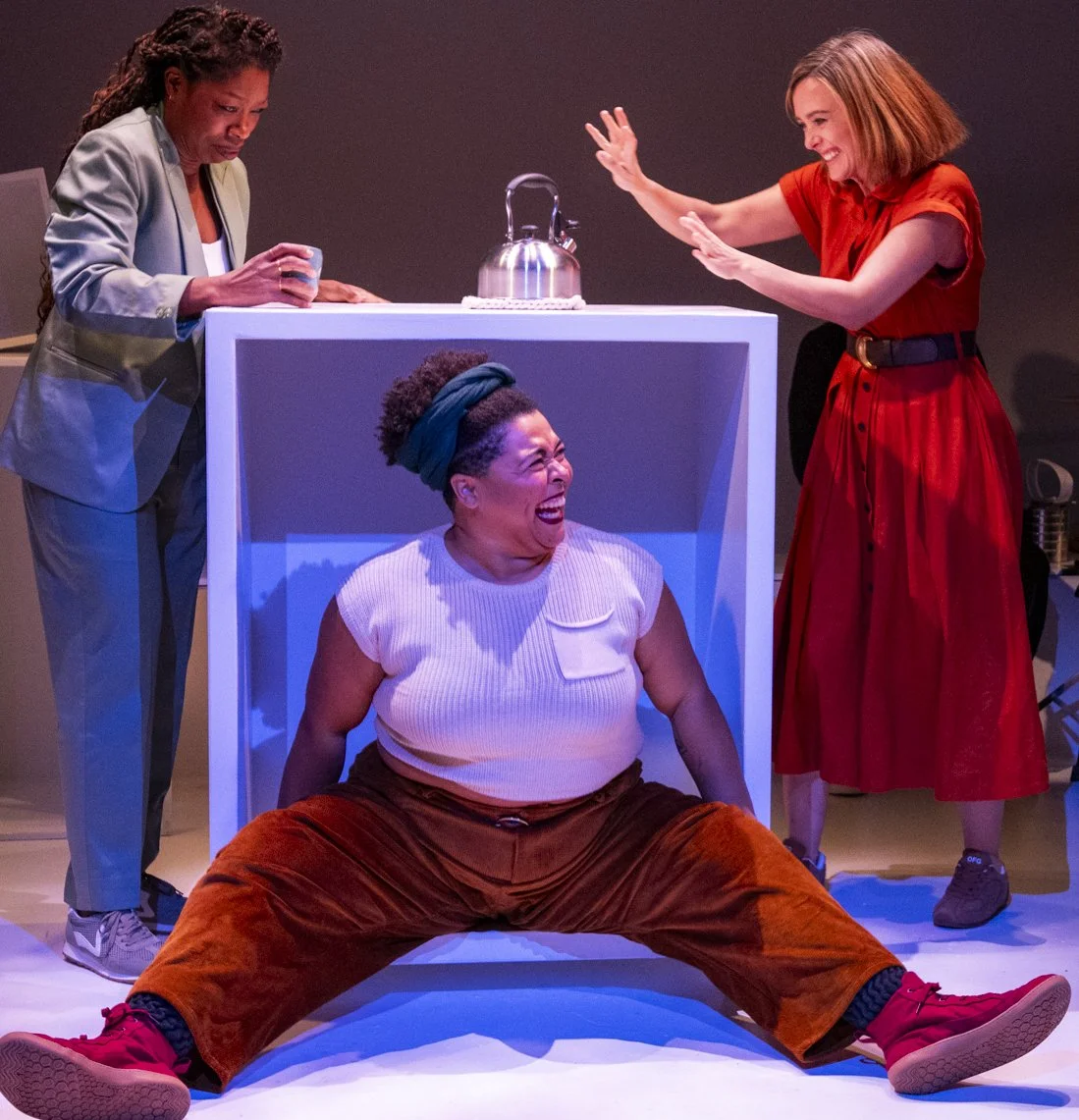C (Akyiaa Wilson, left), D (Cristina Pitter, center) and E (Christina Bennett Lind, right) discuss the nature of grief from a baby’s perspective in Wake.
Grief is very personal, and everyone processes it in their own way and in their own time. Elisabeth Kübler-Ross identified five stages of grief: denial, anger, bargaining, depression, and acceptance. Wake, written by Leon Ingulsbrud and Brooke Shilling, explores the contours of these stages through music, dialogue, musings, reflections, and poetry.
A (Brooke Shilling) and B (Alex J. Gould) are connected by her grief and his attempts at consolation.
Characters have letters instead of names—A (Brooke Shilling), B (Alex J. Gould), C (Akyiaa Wilson), D (Cristina Pitter), and E (Christina Bennett Lind), and a character called the Poet (Adesola Osakalumi)—who perform in a series of vignettes. These anonymous characters move around the stage, interact with one another, and engage in dialogue often without a beginning, middle, or end. Without the rhyme or reason, the play remains in a liminal state.
Although a heavy subject, there are moments of humor, especially with C (Wilson), who plays an emcee of sorts. A (Shilling) lays on one of the moveable squares while C hovers over her like an artisanal chef and says “allow me to be grief, you will eat me.” C then walks up the aisle, mike in hand, and speaks directly to the audience. Like a motivational speaker trying to help a room full of people, she leads the audience in a series of loud “Ooohs” and “Ahhhs.” There is pleasure in taking the big breaths and letting them out collectively.
“Ianthe Demos’ direction keeps the piece moving and light.”
She then calls out: “Fantastic. Let the air in and then let it out. Let it fill up your lungs. When you exhale, allow yourself to expunge all negative emotions. Rage, sadness, despair, frustration. Let it all come out in your voice. As you increase in volume, your crying will turn into wailing. Should you decide to add a melodic element, it will then become a lament.”
As a baby, D (Pitter) explains grief through the eyes of an infant: “the universe can often really suck. I don’t have any way to filter that on my own. It hits me full force. So I scream. You would too.”
C: So why would you ever stop?
D: Exactly! That’s the amazing thing. Sometimes I stop just because physical exhaustion numbs me. But usually, I stop because someone rebels against the indifference of the universe. I stop because someone cares. I stop because of love.
C: Love.
Set designer James Hunting has created the space as a simple white box theater with white boxes of varying sizes on wheels that can be easily moved around to create each mise en scène, such as a bar, a funeral with a casket, and a stovetop for cooking. They also provide spaces to hide or crouch. A wonderful design element is a square in the ceiling from which rain and sand pour into a smaller white box on the floor.
E (Bennett Lind, left) and C (Wilson, right) look on as The Poet (Adesola Osakalumi, center) collapses under the burden of grief.
Ianthe Demos’ direction keeps the piece moving and light, and Rinde Eckert and Ren’s musical accompaniment, on a wide variety of instruments, including percussion (djembes, snare drum, top hat), violin, and sound effects made through taps and vocalizations, create a soft and inviting sonic journey along the way.
There are some great lines in the play and many theatrical elements but, as a theater piece, it could benefit from some more structure and development. Some sections, however, ground the play. The Poet, performed by the exceptional Osakalumi, an excellent mover with a face reminiscent of James Baldwin (who often looked angry, sad, and perplexed all at once), personifies Grief, delivering his reflections accompanied by the soft patter of a djembe: “Grief bumped into me today. I wasn’t sure at first. It was all so sudden. … But it wasn’t the first time. Probably won’t be the last.”
The actors, all top-notch, highlight the sensitive nature of grief as they work with the abstract script and within the abstract structure of the play. E’s (Bennett Lind) opening lines could also be the closing lines as they remind us that everything, even the feelings of grief, are cyclical in nature:
This is a difficult time. This is a sad time. We are here because we’ve lost someone. We are here because something has come to an end. And that’s sad. It just is. But an end is also a beginning. So this is also the beginning of something.
Wake runs through Nov. 23 at 59E59 Theater (59 E.59th St.). Evening performances are 7:15 p.m. Tuesday through Saturday with matinees Saturday and Sunday at 2:15 p.m. For tickets, visit 59e59.org.
Playwrights: Leon Ingulsrud & Brooke Shilling
Director Ianthe Demos
Movement Direction: Natalie Lomonte
Music: Rinde Eckert & Ren





